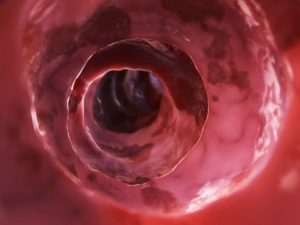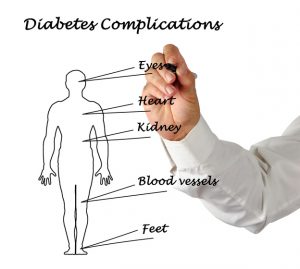 This week’s health news roundup presents news stories about gallstones, diverticulitis, chronic kidney disease, glaucoma, irritable bowel syndrome, and diabetes. The week, we discussed natural ways to treat gallstones, diverticulitis complications, the link between kidney disease and diabetes, and much more.
This week’s health news roundup presents news stories about gallstones, diverticulitis, chronic kidney disease, glaucoma, irritable bowel syndrome, and diabetes. The week, we discussed natural ways to treat gallstones, diverticulitis complications, the link between kidney disease and diabetes, and much more.
Diverticulitis complications: Rectal bleeding, peritonitis, abscess, fistulas, and intestinal obstruction
If diverticulitis is left untreated, complications can arise, including rectal bleeding, peritonitis, abscess, fistulas, and intestinal obstruction. Diverticulitis is brought on by infection or rupture of diverticula, which are bulges forming in the lower part of the large intestine or colon. The risk of developing diverticula is usually higher for people over 40.
Advertisement
Diverticula themselves do not cause many problems, but once the condition progresses into diverticulitis, it can be quite severe, leading to pain, nausea, and changes to bowels. Continue reading…
Natural home remedies for gallstones
 Gallstones are solid crystalized deposits that form from cholesterol and bile pigments in the gallbladder. There are two types of gallstones: cholesterol gallstones and pigment gallstones. Cholesterol gallstones account for 80 percent of gallstones and are usually yellow-green in color. Pigment gallstones are small and dark, and made up of bilirubin.
Gallstones are solid crystalized deposits that form from cholesterol and bile pigments in the gallbladder. There are two types of gallstones: cholesterol gallstones and pigment gallstones. Cholesterol gallstones account for 80 percent of gallstones and are usually yellow-green in color. Pigment gallstones are small and dark, and made up of bilirubin.
Gallstones affect approximately 20 percent of women over 40 and eight percent of men. They can contribute to infection, which needs to be treated with antibiotics, but natural treatments can be effective in managing gallstones, too.
Below you will find some natural treatment options for gallstones to help you relieve the symptoms and speed up the recovery. Continue reading…
Chronic kidney disease and diabetes, a novel link uncovered: Study
 Chronic kidney disease has long been associated with diabetes, but a recent study has uncovered a novel link between the two conditions. The researchers found that when kidneys fail, the buildup of urea in the blood can lead to diabetes.
Chronic kidney disease has long been associated with diabetes, but a recent study has uncovered a novel link between the two conditions. The researchers found that when kidneys fail, the buildup of urea in the blood can lead to diabetes.
Principal investigator Dr. Vincent Poitout said, “We identified molecular mechanisms that may be responsible for increased blood glucose levels in patients with non-diabetic chronic kidney disease. Our observations in mice and in human samples show that the disease can cause secondary diabetes.”
Advertisement
Chronic kidney disease is the irreversible loss of kidney function, which means the kidneys can no longer filter waste and toxins in the blood. Eventually, patients must undergo dialysis or get a kidney transplant. Continue reading…
Glaucoma disease progression may be determined with smart contact lenses: Study
 Glaucoma disease progression may be determined with smart contact lenses. The novelty contacts have a built-in sensor that can help predict glaucoma progression. Certain patterns of electrical signals are emitted from the lenses, correlating with a faster progression of glaucoma.
Glaucoma disease progression may be determined with smart contact lenses. The novelty contacts have a built-in sensor that can help predict glaucoma progression. Certain patterns of electrical signals are emitted from the lenses, correlating with a faster progression of glaucoma.
Largely characterized by high eye pressure, glaucoma still remains the leading cause of blindness. Although checking intraocular pressure in a patient can help determine the state of eye health at the moment, it does not allow to monitor the progression of the disease. Also, eye pressure tests cannot be completed at certain times of the day when eye pressure rises, for example, at night.
The researchers tested 40 patients who were receiving treatment for glaucoma. The patients wore the smart contact lenses for 24 hours – even while asleep. Changes in eye pressure were continuously monitored. Continue reading…
Irritable bowel syndrome associated with independent brain-to-gut and gut-to-brain pathways: Study
 Irritable bowel syndrome is associated with independent brain-to-gut and gut-to-brain pathways, according to research. Researcher Dr. Nicholas J. Talley said, “This is an exciting time as the causes of IBS and other functional gastrointestinal disorders (FGIDs) are slowly being unraveled. The recognition that while nerve signaling is bidirectional, either the gut or the brain can initiate and drive IBS and other FGIDs is another important step forward in helping to solve the mystery of why and how these syndromes occur.”
Irritable bowel syndrome is associated with independent brain-to-gut and gut-to-brain pathways, according to research. Researcher Dr. Nicholas J. Talley said, “This is an exciting time as the causes of IBS and other functional gastrointestinal disorders (FGIDs) are slowly being unraveled. The recognition that while nerve signaling is bidirectional, either the gut or the brain can initiate and drive IBS and other FGIDs is another important step forward in helping to solve the mystery of why and how these syndromes occur.”
The researchers used a validated survey containing questions on Rome III IBS and functional dyspepsia (FD) and the Hospital Anxiety and Depression Scale to test their hypothesis. Continue reading…
